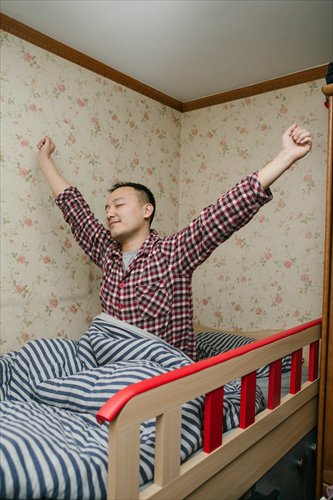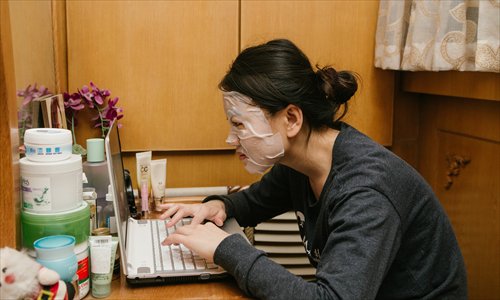How the ‘otaku’ lifestyle is helping young people reclaim their health

More and more young people living in China's urban areas prefer to spend their leisure time at home rather than going out, and are trying to develop healthy ways to do it. Photo: Li Hao/GT
It's been five months since 28-year-old Cai Zheng resigned from her high-pressure job as a fund manager at a Beijing finance company. Her original plan was to take a six-month rest before finding a new job, but she recently decided to extend her hiatus to a year. Unlike most people taking a gap year, however, Cai won't be traveling to exotic locales or relaxing on a beach - she'll be staying at home.
That's because, for Cai, the rationale behind taking time off has less to do with a vacation and more to do with her health. Since she quit her job, Cai has noticed marked improvements in her appearance: She's lost weight, her skin has cleared and her hair is thicker than ever before.
"I want to get even better before I start work again," Cai said. "I was already quite a zhainü on the weekends while I was working, but now, for the first time, I've realized that staying at home is actually a great way of improving your health."
Zhainü (and the male version, zhainan) is a relatively new term that emerged on the Chinese Internet around 2005, based on the Japanese word otaku, which refers to socially inept nerds who spend most of their time obsessively reading comics in their bedrooms. Since then, though, the Chinese term has gained a more positive meaning, referring to people who prefer spending time at home rather than going out.
They're not as much of a minority as people might think. According to a 2012 article by the Beijing Youth Daily, about 49 percent of young city dwellers who were polled said they prefer "staying home to going out."
The results were based on a poll by MEC, one of the world's leading media agency networks, and WebInsight, a Chinese Internet data analysis company, of over 20,000 randomly chosen people living in 46 first- to third-tier cities on the Chinese mainland.
Of course with the Internet and video games, there's more reason to stay home than ever. With more young people spending their free time at home, they've been seeking ways to build healthy lives that are more in keeping with the modern zhainan and zhainü than the stereotypical slothful, not-altogether-hygienic lifestyle of the old-style otaku. Among the greatest challenges for homebodies is staying active.
"Many people have started looking for new habits that suit the modern zhainan and zhainü's life," said Wang Yangguang, a professional fitness instructor at the Hosa Fitness center. He said many clients now ask him for suggestions on how to keep fit while at home. "Even if they do not go to the gym, they can still maintain good health if they manage their lives well."


At home, zhainü can spend more time relaxing and caring for their skin than they can in the office. Inset: Doing exercise such as yoga and dancing at home is a good way to keep healthy. Photos: Li Hao/GT
Becoming a full-time healthy zhainü
Back when Cai was still a fund manager, things weren't good for her health; she was in the overweight category for her height, having serious problems sleeping and starting to lose her hair.
"One day I looked in the mirror and saw a tired, fat woman with bad skin and thin hair, and I made up my mind to rehabilitate myself," said Cai. It helped that she wasn't very satisfied with her job. Within a week, she quit and left the company for good.
At first, Cai thought about joining her parents at a health resort in the mountains of western Zhejiang Province, but soon gave up on that idea due to the expense and concerns over who would take care of her two poodles. "Then I decided to stay at home in Beijing, but to try to make myself as happy and comfortable as possible, and see if I could recover my health."
Cai says she never resorted to any kinds of medicine or health products, but simply focused on four things: rest, diet, dress and exercise. The first and the most important thing she gained from her new full-time zhainü life was enough sleep.
"When I was working, it was a luxury to be able to sleep more than seven hours a night, even on the weekends," Cai said. "Getting enough sleep did a lot to relax me. Waking up naturally is the happiest thing in the world." Cai has also resumed her habit of taking an afternoon nap.
Liu Ying, a general practitioner at the First Affiliated Hospital of Zhejiang University, agrees that sufficient sleep, around eight to 10 hours a night, is the most important feature of a healthy lifestyle, adding that a short afternoon nap, about half-an-hour, in the sunshine, can help with nutrition absorption and energy recovery.
Diet is another important factor. Cai says it was mostly home-cooked meals, made primarily with vegetables, that have helped her lose weight. "I've barely ordered any delivery over the past six months, and the cooking and dishwashing also served as exercise."
Another perk of being a zhainü, Cai says, is that you can dress however you want - even in nothing at all - which frees both the body and the mind. "I feel more relaxed without the lace bra, stockings and high heels I used to wear in the office. I don't need to do my makeup anymore either."
These days, Cai puts the time she once spent on applying foundation, eyeliner and lipstick into skin care, curing her blemishes rather than simply covering them up. "Now I have time to explore and study methods of skin care, and most of the time I liberate my skin from the heavy makeup I used to put on, which is a good thing."
The zhai life isn't all lounging and skin care, however; staying physically active is equally important.
According to Wang, it's best to get exercise out of the way before noon, as the body can remain excited for hours afterward, which could affect sleep quality. "However, a lot of people, especially office workers, come to the gym in the afternoon and evening - some even don't want to leave when the gym closes at 10 pm," said Wang. "I doubt whether it's the healthiest thing, but they have no choice since they have to work in the daytime."
With no office to rush to, Cai started doing exercise in the mornings. She bought a Wii, a home video game console, and began playing motion-sensing games like virtual bowling, tennis and boxing.
"I play Wii about two hours every other day with my air purifier on," said Cai. On the other days, Cai does zhaiwu, a kind of Japanese-style dancing set to ACG (anime, comic and game) background music. "Every morning I am sweaty, excited and happy."
Finding balance at home
The key, Dr Liu says, to a happy zhai life, is finding balance. "When they're just starting out, many people often have bad self control and end up staying up all night and sleeping through the day. It's important to have self-control and limit the amount of time spent with your phone, tablet and computer."
Liu suggests ordering food no more than twice a week because over-reliance on ready-made foods can lead to overeating and obesity. She also says zhainan and zhainü need to make sure they get out of the house. Communicating with other people and socializing are necessary to maintain a healthy state of mind.
This turns out to be a major reason why Cai decided to stay in Beijing during her gap year, despite its pollution and traffic jams - her friends. Although she spends most of her time at home with her two pet dogs, she's continued to hang out with her friends at least once a week. Zhainan and zhainü have a reputation for being bad at socializing, but Cai says her friends have found her to be more open and friendly since she became a zhainü.
"Before, it was always my friends who invited me to hang out with them, but now I invite them," Cai said, adding that she's even hosted several get-togethers at her home for close friends.
Still, Cai's staycation can't last forever. "I will go back to work someday, and I don't think everyone should quit their job to get healthier," said Cai. "When I go back to work, I am going to try to keep up the good habits I formed in this gap year, such as quitting smoking and drinking, as well as wearing comfortable clothing to keep up good health in the future."
Newspaper headline: Home bodies